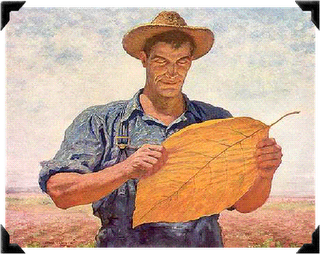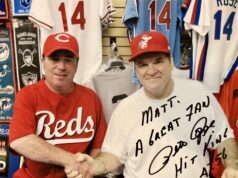 Life in the Burley Belt
Life in the Burley Belt
by Mike Sapp
The Courier Journal ran an interesting article at courier-journal.com/article/20081116/NEWS01/811160539/1008 on the disappearance of tobacco crops across the state. The writer interviews a former tobacco farmer and they discuss some of the reasons Kentucky¹s tobacco farms are an endangered species. Our state leads the nation in adult tooth loss and smoking, yet witnesses public outcry at the mention of a per pack tax increase.
In the past month, I’ve paid $8.50 in Chicago and $6.80 in DC; Lexington is currently $3.63. These are the same cigarettes; the difference is the per pack tax. If the extra revenue went to paying for aging Kentuckians’ oxygen tanks, there would be less backlash. I wrote an article for Dr. Rice’s PS557 class, last year, that addresses many of the same issues in the CJ story.
 Growing up in the tobacco belt, we learned to work in tobacco at a young age. Tobacco was a common site beside the roads and highways across the state. It might be pretty to look at growing in the fields, but always looked best in the form of a check once it sold at market. This was life as I knew it on the weekends growing up in rural Kentucky. In the early ’80s my parents bought a small farm in Taylor/Adair county line. It’s also the dividing line to what people refer to as slow time/fast time time zone. It separates two school districts, and two different utilities companies.
Growing up in the tobacco belt, we learned to work in tobacco at a young age. Tobacco was a common site beside the roads and highways across the state. It might be pretty to look at growing in the fields, but always looked best in the form of a check once it sold at market. This was life as I knew it on the weekends growing up in rural Kentucky. In the early ’80s my parents bought a small farm in Taylor/Adair county line. It’s also the dividing line to what people refer to as slow time/fast time time zone. It separates two school districts, and two different utilities companies.
Infrastructure is far from ideal to residents of the area, this is the boondocks. It’s normal not to have a neighbor within ‘hollerin distance.’
The rural county lifestyle is one all its own. The one thing most everyone has is a little bit of land. My parents both grew up on farms; and kept with tradition and applied for a tobacco base. We were awarded X amount of pounds of burley tobacco to grow in a calender year. Our tobacco quota was small compared to what full time professional farmers grew. Even though we were weekend warrior tobacco farmers, that made it no less a priority when Dad got home from work. My brother and I were expected to help with anything we were told to do. If you want to live in a nice house, then you better chop weeds and follow the tobacco setter.
When I was in 8th grade I wanted a four-wheeler like everyone else already had. When I asked my dad he replied “yeah get a job and buy one.” So my new job was an acre of the family tobacco base of which I was expected to take care of – from start to finish, my own acre. Since this was my crop I got paid for it when it sold in January, expenses would then be deducted by my father. I used his tractor, implements, and fertilizer and he would front the bills as he would be doing the rest of the crop alongside mine. Tobacco work became my main source of income. In addition to my acre, there was always plenty of work found on local farms, and once people knew you were a good worker there was never a day off. This was good honest work that most anyone with a strong back could earn a living wage. (Think Harvey Keitel’s tip speech in Reservoir Dogs). Later as a high school student, cars and car stereos became my priority and tobacco paid for it all.
Fast-forward ten years and that lifestyle has been long dead. Small tobacco bases were bought out by the government and most all state tobacco production is done on the large scale. Most of the farmers I used to work for still have portions of their original monster tobacco base, but paltry compared to the old days. They have started becoming income-dependent on other types of farming. That attainable income and way of life has died. Dead like the thousands of Kentuckians killed each year from smoking. Dead like my lungs feel every morning while I cough myself awake.
 I have been a pack-a-day smoker since 1997. I’ve also used smokeless tobacco daily for years. I’ve had nicotine poisoning a few times, from going out to cut tobacco too early in the morning, while the dew was still on. The dew on the tobacco leaves is like liquid nicotine, get too much of it on your skin and you get REAL sick.
I have been a pack-a-day smoker since 1997. I’ve also used smokeless tobacco daily for years. I’ve had nicotine poisoning a few times, from going out to cut tobacco too early in the morning, while the dew was still on. The dew on the tobacco leaves is like liquid nicotine, get too much of it on your skin and you get REAL sick.
Nicotine poisoning was the worst effect of tobacco I had experienced until I recently realized what a slave I am to the tobacco industry. When I bought cigarettes over food I knew that was the new all-time low in my life. I am a slave to the industry that I thought brought me wealth and opportunity a long time ago. Thank you for Smoking! I never did cash in all that Camel
Cash to get that cool pool table. I also never saw myself as a 30 year old smoker.
Kentucky has the highest percentage of adult smokers in the Nation. Our healthcare system is in shambles, statewide, as a direct result. Cigarettes are way too cheap in any gas station, anywhere inside the commonwealth; we need to double tax cigarettes and pay for some much needed healthcare. I know damn well I will smoke less if I have to pay twice as much. Why do we insist on giving our lives so that North Carolina can prosper? They got our tobacco base and we sign our own death warrants. By increasing the cigarette tax we could fund expanded health care for children statewide, and stop being first in a category where we’re not proud to be ranked: Smoking.
Mike Sapp is a UK student and Intern for Bluegrassroots.org. This essay appeared as a Guest Essay in Ace’s Nov 20 issue.







